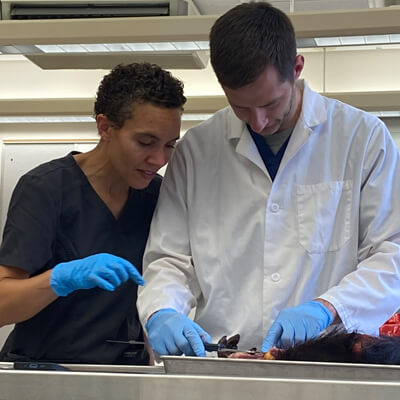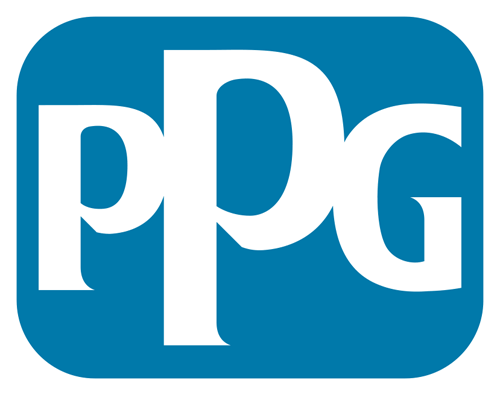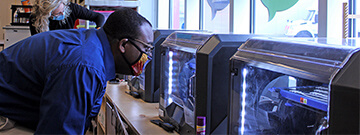
Join us for Café Scientifique
Interested in science? Want to learn more about the latest technology breakthroughs in normal English, minus the jargon? Then Café Scientifique Pittsburgh at Carnegie Science Center is the place to be!
Café Sci is THE place in Pittsburgh where anyone interested in science can get together to discuss today’s science issues with experts, and best of all… you can ask your own questions! After a brief talk by our monthly guest speaker, the evening is dedicated to a question-and-answer session.
|
Presented by: |
Café Sci – Phages through the Ages: Past, Present, and Future of the Viruses that Infect Bacteria
Reevaluating classic hypotheses through new lenses: how technology is clarifying out biomechanical past
Upcoming onsite and virtual lecture:
Mon., May 6
7–9 pm
Register for the free onsite and virtual lecture! ![]()
Presenters
Drs. Erin Marie Williams-Hatala and Kevin Hatala, PhD
Assistant Professors of Biology, Chatham University

Classic hypotheses in functional morphology postulate connections between human anatomy and behavior that are thought to define “what it means to be human”. Archaeological evidence of these behaviors, or fossil evidence of the associated anatomies, have been assumed to represent key milestones in human evolution. For example, our large thumbs evolved at the interface of human anatomy and the earliest technology in the archaeological record, and are thought to have enabled our ancestors to engage in stone tool production and use.
New technologies have provided us with novel ways to revisit and test some of these classic hypotheses in experimental contexts, and these studies are yielding surprising and exciting results.
In this talk, we will discuss some of our most recent experimental work that informs long-standing questions about the biomechanics and functional morphology of our fossil relatives.
About Drs. Erin Marie Williams-Hatala and Kevin Hatala
Drs. Erin Marie Williams-Hatala and Kevin Hatala both earned their PhDs from the Center for the Advanced Study of Human Paleobiology at The George Washington University. Their individual and joint research focuses on the evolution of the human upper and lower limbs, with Dr. Williams-Hatala focusing on the former and Dr. Hatala focusing on the latter, when they are not collaborating. They live in Pittsburgh, PA with their two dogs, with 12 other family members in their neighborhood.
Register for Café Sci
The event is FREE to attend onsite and virtually, but preregistration is required ![]() ! Carnegie Science Center would like to continue to offer programs like Café Sci, Women in STEM, and others. Please consider making a donation when you register. Once you sign up, you’ll get an email confirmation. Have a question for Dr. Williams-Hatala and Dr. Hatala? You’ll be able to type your questions in the Q&A section during the presentation!
! Carnegie Science Center would like to continue to offer programs like Café Sci, Women in STEM, and others. Please consider making a donation when you register. Once you sign up, you’ll get an email confirmation. Have a question for Dr. Williams-Hatala and Dr. Hatala? You’ll be able to type your questions in the Q&A section during the presentation!
We want to hear from you!
What impact has Café Sci had on you? Are you a scientist interested in speaking at Café Sci? Do you have a recommendation for a speaker or topic? Contact us at info@carnegiesciencecenter.org.
Virtual Café Sci Presentations
You may also like…
The Science Behind Pixar
The Science Behind Pixar
Coming soon!
May 25, 2024—Jan. 5, 2025
Laser Shows
Laser Shows
Fab Lab 101 Workshops
Fab Lab 101 Workshops
21+ Nights
21+ Nights







